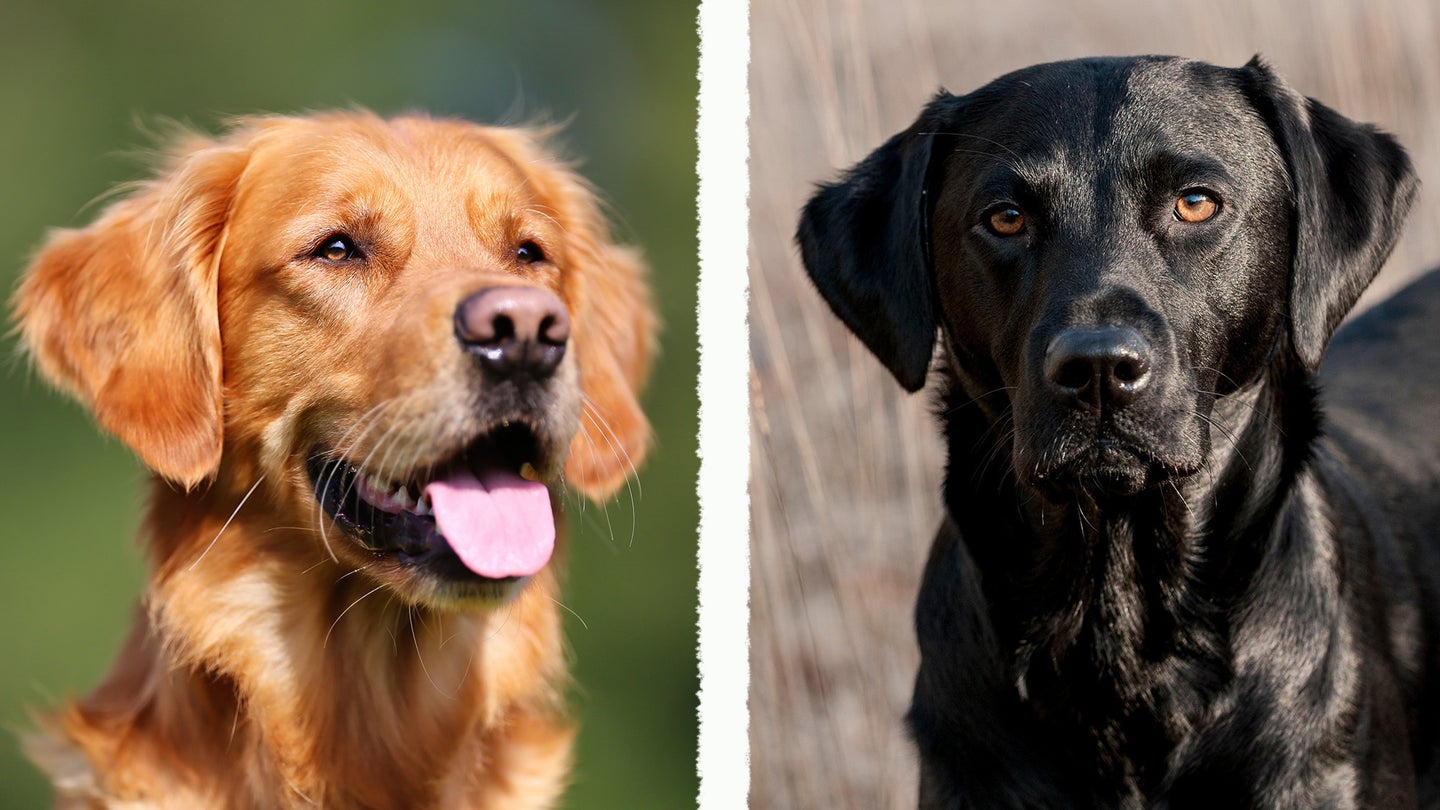Golden Retriever vs Labrador
Golden and Labrador retrievers are are popular family pets and superstars in the field. But which is better for you?

Both Labrador and golden retrievers consistently rank among America’s most popular dog breeds. Non-hunting owners love the friendly demeanors that make the two great family dogs. They are highly trainable, as both excel in service-dog roles. Hunters prize both breeds for their abilities as gun dogs, particularly for waterfowl, but each can double as a flusher in the uplands, too. You can’t go wrong with either breed, but there are distinct differences between the two. Here are some criteria to help you choose between golden retriever vs Labrador.
Chart: Golden Retriever vs Labrador at a Glance
Labrador Retriever

Height: 21.5- 24.5 inches
Weight: 55-80 pounds
Coat: Medium length, oily, black, yellow or chocolate, a few are silver or red
Temperament: Affectionate, eager to please, strong hunting/retrieving drive
Golden Retriever

Height: 21-24 inches
Weight: 55-75 pounds
Coat: Long, soft, double coat, golden-red
Temperament: Affectionate, eager to please, may be slow to mature, strong hunting/retrieving drive
Golden Retriever vs Labrador: Breed Histories

Labs descend from the St. John’s water dog, a breed developed in Newfoundland as a fisherman’s working dog. Hardy dogs able to stand cold water, they hauled nets and lines in the water. Visiting English sportsmen saw their potential as retrievers and brought them back across the Atlantic, crossing them with other breeds until the Labrador retriever was born.
Goldens hail from Scotland. In the 1850s and ’60s, Sir Dudley Marjoribanks began crossing flat-coated retrievers with Tweed water spaniels (both of which contain Labrador retriever ancestry) at his estate, Guisachan, selecting for light-colored dogs. Sir Dudley mixed a few other breeds over the next 20-some years until he had produced what he believed was the ideal breed for the damp, cold conditions of Scotland: a light-colored, medium-size dog with a warm double coat and webbed feet that could retrieve game on land and in water.
Breed Comparison
Labs and goldens are about the same size, as breed standards dictate male Labs will range from 55 to 80, while male goldens find themselves in the 55- to 75-pound range. The coat is the biggest difference between the two in regard to physical appearance. Labs have a comparatively short, dry, oily coat that insulates them in water. Goldens have a long, warm double coat and, per their name, are primarily golden-red in color. Labs come in black, yellow and chocolate.
Both dogs typically share warm, intelligent, family-friendly personalities that make them great pets in the home, if terrible watchdogs. They tend to welcome strangers regardless of whether they are friends or intruders. Both breeds are highly trainable and intelligent, and can be trained to do a number of different jobs.
Golden Retriever vs Labrador: Hunting Differences
Labs are much more popular among waterfowl hunters than are goldens, which is partly due to the to the Lab’s shorter, low-maintenance coat. It’s also true that goldens were primarily developed to retrieve upland birds and do some duck hunting on the side.
There are excellent waterfowl retrievers among goldens, but if you are looking for a duck dog, it’s easier to find a Lab from a kennel that breeds credentialed gun dogs. Some people believe goldens are slower to mature, and that Labs, therefore, can be trained and ready to hunt at a younger age than goldens.
In the uplands, both breeds make very good flushing dogs. They are quite popular, especially among pheasant hunters, as they will plow into thick cover to find and flush birds, and they are relentless on the trail of running, crippled roosters. With both breeds being water dogs, they are especially well-suited to boost pheasants out of marshes and cattail sloughs in the late season.
Golden Retriever vs Labrador: Picking a Puppy
If you want a duck hunting dog, a Lab is usually the easier choice. Less maintenance means less stopping during or after your hunt, and more hunting-focused kennels means more available puppies. If you go this route, it’s worth looking into litters of both American and British Labs. American Labs are known to have more drive, while British Labs carry a reputation as excellent hunters with a more laid-back demeanor. Meanwhile, you can find goldens from waterfowl-hunting stock, but they aren’t as common. If you want a flusher for the uplands, either breed makes a great choice. Goldens will gather more burrs in their longer coats, however, and both shed quite a bit.
Almost more important than which breed you choose is which breeder you pick. Non-hunters with an affinity for the breeds greatly outnumber hunters looking for a trusty retriever. Verify that any puppy you buy comes from hunting stock and from a reputable breeder. Be sure the dogs come from healthy lineage as well, as any time a medium or large breed becomes popular, ailments like dysplasia become more common, too.
Frequently Asked Questions
Do Labs or goldens bark more?
Neither breed is known to bark excessively. Barking can become a habit with any dog, however, and breeds naturally vary quite a lot. But unlike miniature dogs, hounds and watchdogs that are sure to bark no matter the pup you choose, neither retriever has a reputation for being particularly vocal.
Which is easier to train, a Lab or a golden retriever?
Both Labs and goldens can be trained to perform a wide range of tasks, from making multiple blind retrieves to working as seeing-eye or other types of service dogs. Despite Labs’ reputation to learn faster, variability within the breeds will ultimately answer this question, as you could easily wind up with a Lab that’s a slow learner or a golden that’s a quick study.